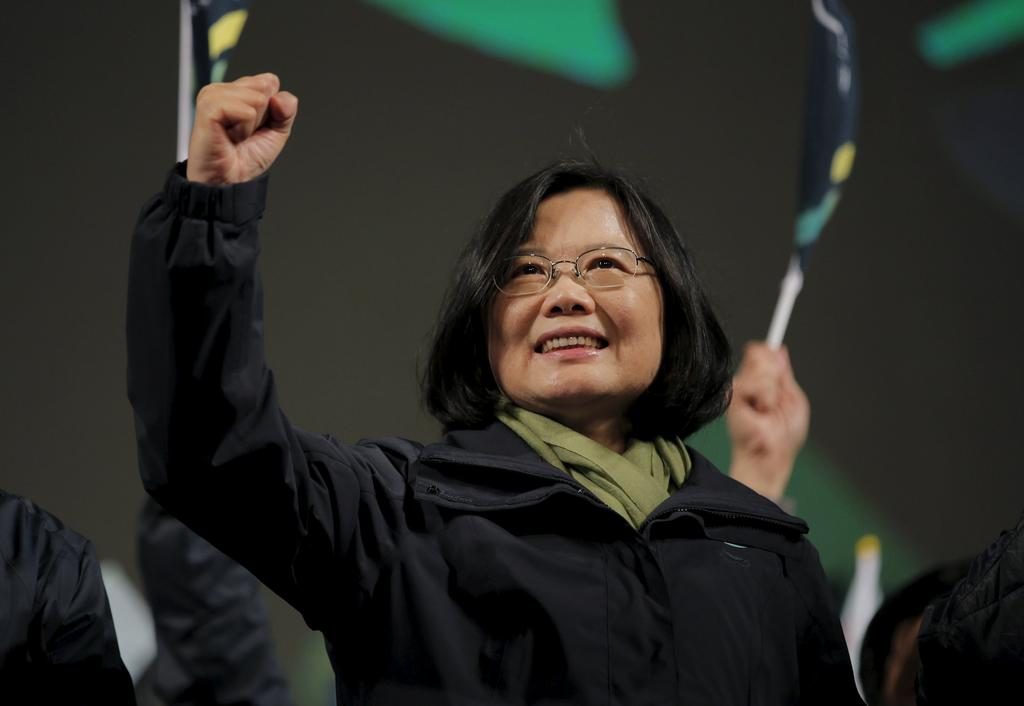Washington: Taiwan’s president addressed members of New York’s Taiwanese community in a US stopover on her way to Central America as she seeks to rally allies of the self-ruled island amid tensions with China.
Pro-China demonstrators waving the Chinese flag rallied against President Tsai Ing-wen’s events in New York. One protester held a sign whose slogan declared the Taiwanese leader a “big traitor of China.”
In a speech Wednesday night to fellow Taiwanese in New York, Tsai thanked the United States for its security assistance and urged Taiwanese unity.
“The safer Taiwan is, the safer the world will be,” she said, and pledged Taiwan would work with its democratic partners to remain on the path of democracy.
Tsai arrived in New York Wednesday and was expected to spend Thursday in closed events in the city. Taiwan is carefully calibrating Tsai’s stops in the United States and forgoing official meetings with senior US leaders in Washington in an effort to limit the scale of China’s response.
Thursday, Chinese Foreign Ministry spokesperson Mao Ning restated China’s furious objections to any interactions between Tsai and US officials.
“China firmly opposes any form of official interaction between the US and Taiwan,” Mao told reporters at a daily briefing in Beijing. “China will continue to closely follow the situation and resolutely safeguard our sovereignty and territorial integrity.”
A senior Chinese diplomat in Washington, embassy charge d’affaires Xu Xueyuan, pointed to an expected meeting between Tsai and House Speaker Kevin McCarthy, likely next week. The meeting would have significant repercussions overall and a “serious, serious, serious” impact on US-China relations, she said in a virtual session with reporters Wednesday.
While the US terms relations with Taiwan as unofficial, it remains the island’s chief source of military hardware and cooperation. US law requires Washington to treat all threats to the island as matters of “grave concern,” but does not explicitly say whether the US would commit troops.
Sen. Robert Menendez, a New Jersey Democrat and chairman of the Senate Foreign Relations Committee, said he hopes any US officials meeting unofficially with the president convey that American support for Taiwan is “strong and unequivocal.”
Last August, Beijing responded to the visit of then-House Speaker Nancy Pelosi to Taiwan by launching missiles, deploying warships across the median line of the Taiwan Strait and simulating a blockade of the island. China also temporarily suspended dialogue with the US on climate and other major issues and restricted military-to-military communication with the Pentagon.
Tsai has made six trips through the US during her presidency, meeting with members of Congress and members of the Taiwanese diaspora. Administration officials are underscoring that her coming trip, which Taiwan calls a “transit,” is in line with what she and her predecessors have done in the past.
Tsai’s “transit is consistent with our longstanding unofficial relationship with Taiwan and is consistent with the United States’ one-China policy, which remains unchanged,” White House national security spokesman John Kirby told reporters.
“The People’s Republic of China should not use this transit as a pretext to step up any aggressive activity around the Taiwan Strait,” Kirby said. “The United States and China have differences when it comes to Taiwan. But we have managed those differences for more than 40 years.”
Tsai told reporters before boarding her plane to the United States that “Taiwan will resolutely safeguard the values of freedom and democracy.”
“External pressure will not obstruct our resolution to engage with the world,” she said.
Tsai is expected to meet with the American Institute in Taiwan chair, Laura Rosenberger. AIT is the US government-run nonprofit that carries out unofficial relations with Taiwan.
Her stops in Central America are expected to shore up Taiwan’s partnerships there, after Honduras this month switched its diplomatic relations from Taiwan to China. Tsai accused China of using “dollar diplomacy” to lure away Honduras. Just 13 countries now officially recognise Taiwan.
Republican Rep. Mike Gallagher of Wisconsin, the chairman of the House Select Committee on China, said the visit is a chance for Tsai “to convey to the Congress how important the partnership between the US and Taiwan is, and what’s necessary to preserve peace and stability across the Taiwan Strait.”
Xu, the Chinese diplomat in Washington, accused Taiwan and the US of harbouring other aims for her trip.
“It should be clear to all that the so-called transit is merely a disguise to her true intention of seeking breakthrough and advocating Taiwan independence,” she said.
Tensions between Washington and Beijing have grown as China under President Xi Jinping seeks to expand its regional and global influence. Passage of what the US said was a Chinese spy balloon across the US this winter heightened Americans’ sense of challenge from China. China says it was a research balloon that was blown off course.
AP
